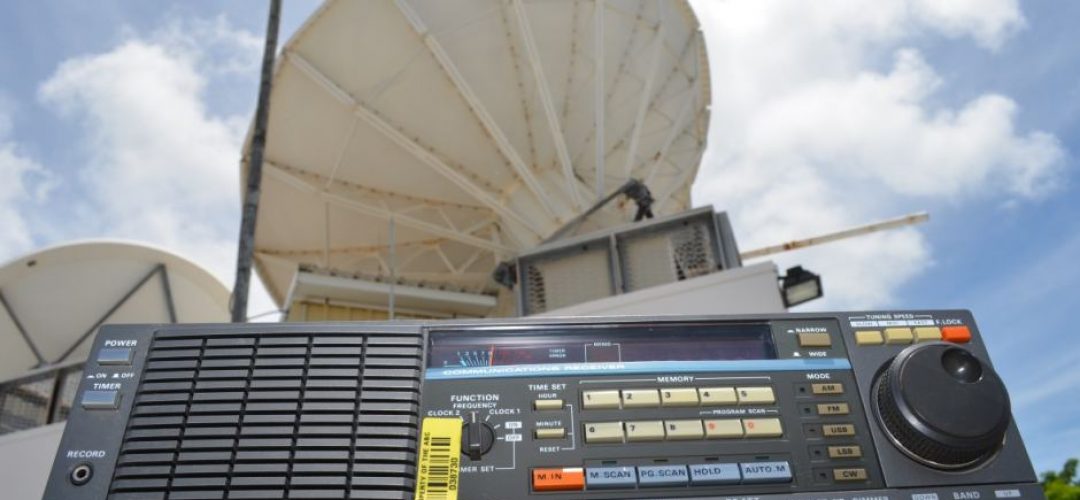USP Journalism staff, students back moves to reinstate ABC services in the Pacific

The ABC announced in December, 2016 that that it was ending shortwave services. It ceased shortwave broadcasting in the Asia-Pacific region on January 31, 2017. Picture: www.abc.net.au
Report by WANSOLWARA STAFF
ABC’s sustained coverage of major events, issues and disasters in the Pacific region has played a vital role in keeping people informed about events that affect their lives.
And according to staff and students of The University of the South Pacific’s Journalism Programme, this independent coverage and reporting should continue unabated for the sake of democracy, freedom of speech, economic development and decision-making processes, as well as for humanitarian reasons.
In their written submission to the Australian Government’s Review of Australian Broadcasting Services in Asia Pacific, USP Journalism staff and students said the closure would greatly affect Pacific communities who relied on international broadcasters such as Radio Australia and Radio New Zealand for independent news and vital emergency information.

Packed house and lots of support for the rebuilding of ABC broadcasting in Asia and the Pacific at ABC Friends rally in Sydney in July. Picture: JEMIMA GARRETT/SUPPORTERS OF AUSTRALIAN BROADCASTING IN ASIA AND THE PACIFIC FACEBOOK PAGE
“Given the geographical landscape of the Pacific region, it is our view that radio remains the most effective and efficient means of communication and source for information, particularly in areas that are under-resourced and challenged by development and sustainability issues,” the group highlighted in their submission.
“Closing the service breaks a vital and long-standing cultural and educational link between Australia and the Pacific that took decades to establish. For example, USP staff and students use Radio Australia for research, education and to keep up with the news in the region.
“Radio Australia is only one of two major broadcasters to provide a daily snapshot of important developments in our part of the world, the other being Radio New Zealand International. During times of political upheavals, coups and uprisings, such as in Fiji and the Solomon Islands, when the media and the people were subdued and silenced; when tyranny reigned, Radio Australia kept pumping out news and information independently.
“Besides everyday listeners, governments and decision-makers in the region, who needed reliable information, tuned in. Now that the service is closed, there will be no such lifeline in future.”
The submission noted that Radio Australia was by no means perfect and besides using it as an example on how to report to the Pacific, USP Journalism had at times used it as an example of how not to report the Pacific.
“But by and large, Radio Australia is a trusted, reliable and valuable journalistic source. It’s unfathomable that a government with such a high stake/investment in democracy, human rights and development in the region, has taken this step, which undermine its own principles and interests in the region,” the submission noted.
“We agree with Australian freelance journalist and former ABC reporter Ms Jemima Garrett’s statement that the Australian media, in the form of the ABC’s international services (Radio Australia, Australia Plus TV, and digital and online services) has played a crucial role in promoting debate, transparency and good governance in the Pacific and Asia. Cuts to Radio Australia leave a huge vacuum in their wake.”

Staff and students of the USP Journalism Programme in Suva. Picture: WANSOLWARA
In the submission, USP Journalism staff and students also endorsed the Australian Department of Foreign Affairs and Trade’s submission to the Senate Environment and Communications Legislation Committee Inquiry into the ABC Amendment (Restoring Shortwave Radio) Bill 2017, which states that, “ABC’s services to the Pacific provide a valuable channel for delivering news, Australian perspectives and content, and advancing Australian public diplomacy in the Pacific. ABC broadcasts have also served during emergencies to deliver warnings and updates.”
The Australian Broadcasting Corporation ceased shortwave broadcasting in the Asia-Pacific region on January 31, 2017, ahead of a reported transition to FM transmission. The move was apparently in line with the Australian broadcaster’s commitment to dispense outdated technology and expand its digital content offerings including DAB+ digital radio, online and mobile services, together with FM services for international audiences. By some estimates, the closure of the transmission is expected to affect 10 million.
A few days ago, ABC chairman Justin Milne resigned amid an ongoing scandal at the national broadcaster and a probe into allegations of political interference. Just this week, ABC’s managing director Michelle Guthrie was sacked after just two and a half years into her five-year term.
Last month, Australian Foreign Minister Julie Bishop told RN’s Fran Kelly that her party did not support the ABC’s decision to switch off short wave services in the Pacific.
* Views expressed are those of USP Journalism staff and students, and do not reflect the views of the University.

USP Journalism staff and students. Picture: WANSOLWARA










